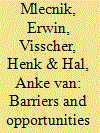|
|
|
Sort Order |
|
|
|
Items / Page
|
|
|
|
|
|
|
| Srl | Item |
| 1 |
ID:
097439


|
|
|
|
|
| Publication |
2010.
|
| Summary/Abstract |
Promoting energy efficiency in the building sector is essential if the agreements of the Kyoto Protocol are to be honoured. Different initiatives for energy labelling of highly energy-efficient residential buildings have emerged throughout Europe as an essential method to stimulate market demand, to control grants or to ensure the quality of demonstration projects with excellent energy performance.
The paper identifies the barriers and opportunities for the further diffusion of labels for highly energy-efficient houses. A model based on the theory of the diffusion of innovation is developed to analyse perceived attributes of existing European labels. The paper investigates the innovation characteristics of existing labels in Europe, with a focus on advanced countries. The question of compatibility with the development of the European Energy Performance of Buildings Directive (EPBD) is examined in detail.
We found that the diffusion of emerging and already existing voluntary European labels for highly energy-efficient houses is needed. Their complexity can be lowered and relative advantage, trialability, observability, and compatibility can be increased. EPBD calculation procedures should be able to receive highly energy-efficient houses. In the framework of the recast of the EPBD, official recognition of existing voluntary labels is recommended.
|
|
|
|
|
|
|
|
|
|
|
|
|
|
|
|
| 2 |
ID:
171438


|
|
|
|
|
| Summary/Abstract |
European energy policies call for an increased share of renewable energy sources and a more active role of the energy consumer. This is facilitated by, amongst others, buildings becoming energy flexible hubs, supporting smart energy grids with demand response strategies. While there is abundant technical research in this field, the related business and policy development is less well documented.
This research scopes existing policy programmes and identifies opportunities and barriers to business development supporting energy flexible buildings. Using examples from seven European countries, this work reviews influencing niche management factors such as existing policy instruments, business development cases and identified stakeholder concerns, using literature research, narrative analysis and stakeholder research.
National policy pathways show many differences but confirm that European buildings might become active players in the energy market, by providing energy storage, demand response and/or shifts in the use of energy sources. Slow sustained business development for energy flexibility services was mainly identified in the retail industry, and for energy service companies and aggregators. The direct involvement of end users in energy flexible buildings is still difficult. Stakeholders call for policy improvement, especially concerning the development of flexible energy tariffs, supporting incentives, awareness raising and more stakeholder-targeted business development.
|
|
|
|
|
|
|
|
|
|
|
|
|
|
|
|
|
|
|
|
|